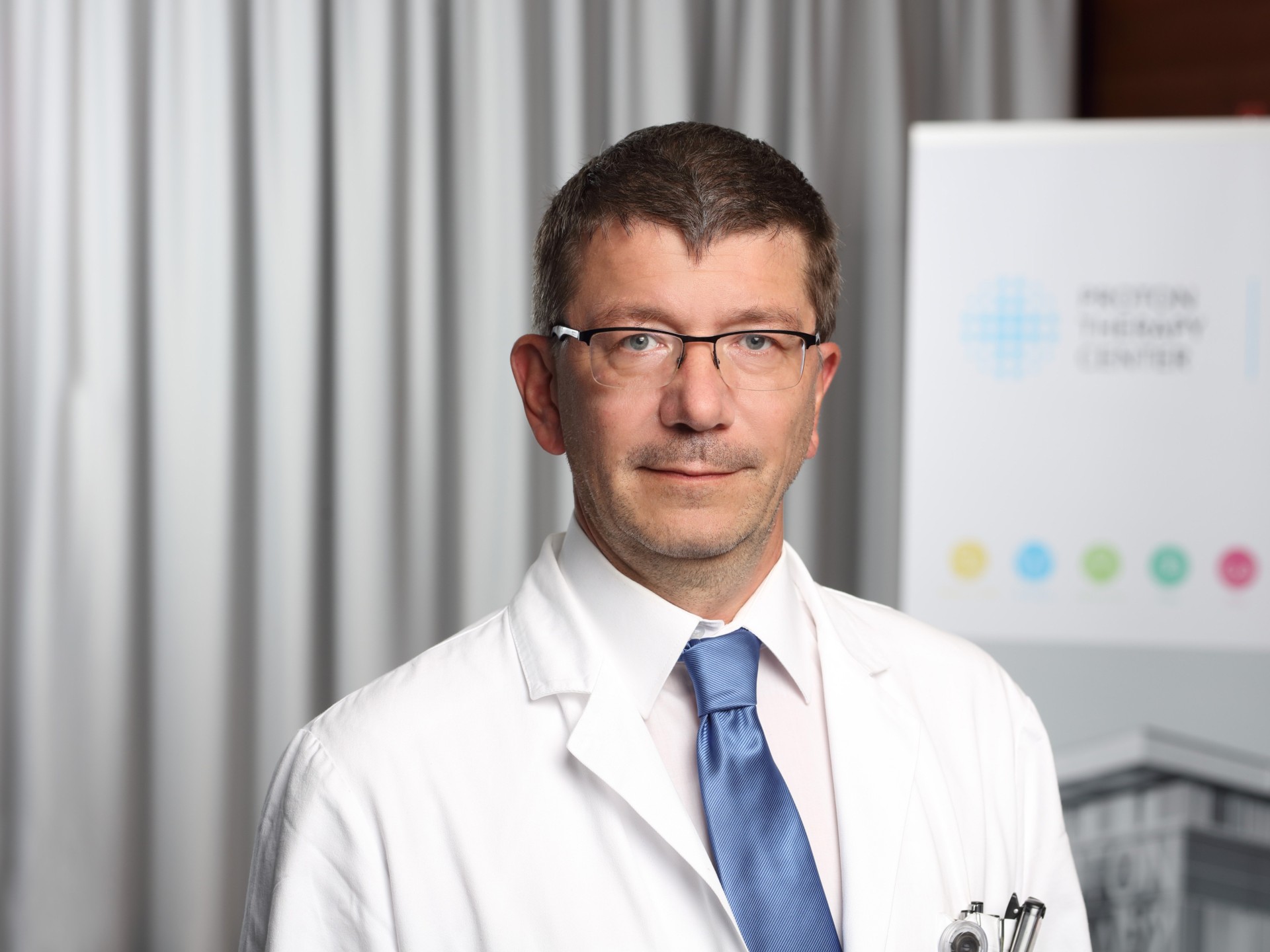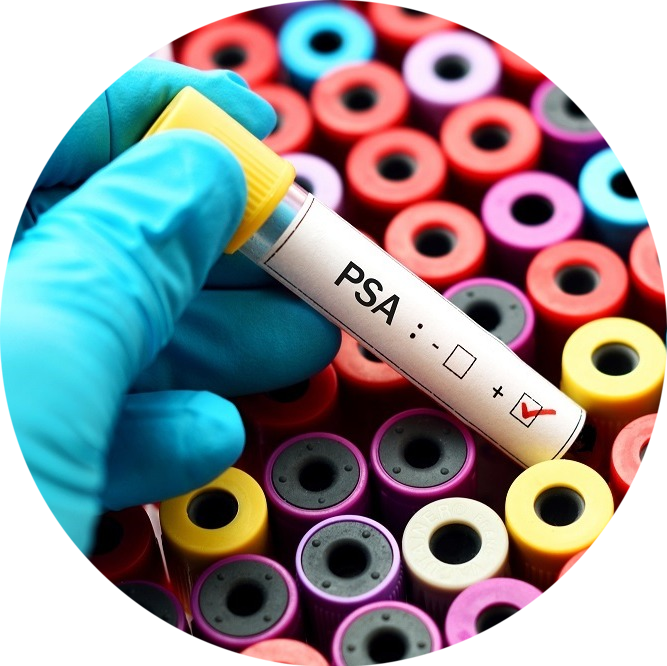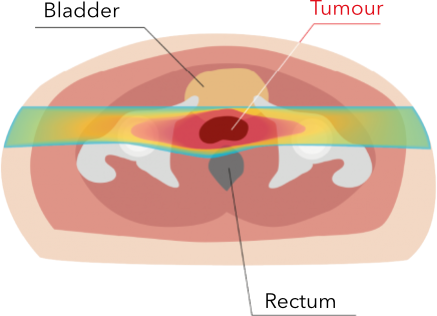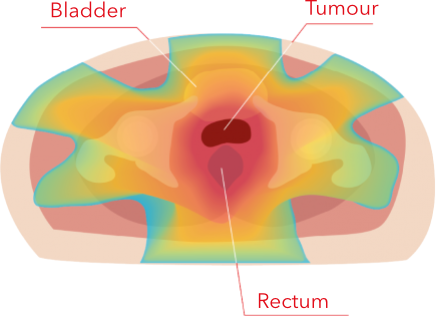
Prostate cancer is the most common diagnosis treated in the proton centres worldwide. It is the diagnosis where the largest number of patients have been treated with protons (tens of thousands). The reason is that prostate cancer is relatively common and the target volume that needs to be irradiated is small. Additionally, the tissues through which the proton beam must pass (muscles and skeleton) are stable thorough treatment.
Since opening in 2012, we have treated over 2,500 patients with prostate cancer. Based on long-term monitoring of said patients, the Proton Therapy Center can boldly boast excellent results and achievements of proton radiotherapy. Ongoing evaluation processes of our results show that from 2012 until now, we have managed to cure 98-99% of low-risk prostate carcinoma patients, of which 99% of patients do not experience any difficulties with incontinence.
Thanks to the precision of the proton beam, the risk of impotence (erectile dysfunction) is substantially reduced compared to conventional treatment methods. The precision of the procedure plays the most important role in maintaining the man’s potency. Intervention near the nerves, damage to which causes erectile dysfunction, represents the risk factor in surgery. In addition, protons can significantly reduce undesirable irradiation in the penis bulb (root) area, which is one of the causes of erectile dysfunction after radiotherapy.
Incontinence refers to the involuntary leakage of a small amount of urine, which causes a social and hygiene problem for patients. For an active man, permanently wearing incontinence aids represents a major problem. After proton therapy, the risk is minimised to a mere 1%. On the other hand, after surgery (complete prostate removal), up to 15% of patients suffer from spontaneous urinary leakage. In the case of conventional radiation therapy, up to 5% of patients suffer from this complication.
Another patients’ big concern is whether the disease can relapse. The disease usually relapses in 10% of cases after surgery and in 5% of cases after conventional radiation therapy. After decades of experience in proton centres in the USA and Japan, the disease relapses in approximately only 3% of cases after proton therapy (applies to low-risk prostate cancer).
Based on the latest published data, following proton therapy, the 5-year survival rate without PSA relapse is 97–99% for low-risk prostate carcinoma, 85–95% for moderate-risk prostate carcinoma, and 75–85% for high-risk prostate carcinoma.
 |
Thanks to the prostate-specific antigen (PSA) blood test, we are able to detect prostate cancer already in its early stage, at a time when it cannot be detected by any other method. The PSA test performed after the age of 40 allows us to actually predict the risk of developing prostate cancer in the future for the particular man. After the age of fifty, it should be a matter of course to see a urologist every year. Those who have a blood relative suffering from prostate cancer should be examined from around forty years of age. |
Advantages of proton therapy over conventional radiotherapy
Excellent long-term results are available from major prospective studies and data supporting proton therapy’s higher effectiveness and safety in comparison with photon radiation (IMRT). The data come mainly from the USA and Japan, i.e. from countries where proton radiotherapy has the strongest supportive environment (for example, in the USA there are already 26 centres, with 9 nearing completion) and is seen as a common procedure. In 2018, convincing data and published papers were reflected in the updated recommendations of the American Society for Therapeutic Radiology and Oncology according to whose current guidelines (NCCN Guidelines v. 4 2018) proton radiotherapy of prostate carcinoma is considered a standard therapeutic method for prostate carcinoma.
Proton therapy’s main advantages:
- Reduced risk of incontinence
Radiation to the bladder and surrounding areas can cause incontinence, erectile dysfunction etc. Proton therapy limits the radiation to the tumour itself, increasing the chances of avoiding urinary complications such as involuntary leakage. - Reduced risk of erectile dysfunction
Surgery for prostate cancer can result in erectile dysfunction, which is one of the most common side effects. Due to proton therapy’s targeted approach, studies have found that patients who’ve had proton therapy have a significantly reduced risk of impotence, with 94% of men reporting that they remain sexually active. - Fewer gastrointestinal side effects
Multiple studies have found that proton therapy reduces the risk of gastrointestinal side effects in comparison with IMRT and other radiation techniques. This is because proton therapy significantly decreases the radiation dose to gastrointestinal structures. - Painless, with reduced recovery time
Proton therapy is a relatively painless, non-invasive outpatient procedure. It does not require recovery time and has little or no impact on a patient’s energy levels. - In the case of high-risk prostate carcinoma, proton radiotherapy allows for irradiation of the pelvic lymph nodes with high probability of subclinical affection. This clinical situation best reflects the dosimetric and clinical benefits of proton radiotherapy as it causes no harm to organs in the abdominal cavity, in particular the intestinal villi.
- Fully outpatient treatment
|
PROTON IRRADIATION Protons target the tumour directly, sparing healthy tissues and organs from unwanted effects. |
PHOTON IRRADIATION
|
Based on the latest published data, following proton therapy, the 5-year survival rate without PSA relapse is 97–99% for low-risk prostate carcinoma, 85–95% for moderate-risk prostate carcinoma, and 75–85% for high-risk prostate carcinoma.
- Mr Holy (PhD) is an expert urological and paediatric urological specialist, with over 20 years of medical and surgical experience.
- He is a consultant, urologist and urological surgeon at Kingston Hospital NHS Trust, UK.
- Mr Holy uses the safest and most advanced technologies available to treat the urological conditions of his many patients, with a particular focus on prostate disease.
- Mr Holy encourages early detection and treatment of prostate disease.
- Mr Holy prepares patients for proton therapy treatment in Prague, and provides follow-up care to patients that previously underwent treatment at the Proton Therapy Center in Prague.
Proton therapy in Prague
In order to choose the optimal treatment, it is important to receive comprehensive and comprehensible information. If your physician discovers you suffer from prostate cancer, carefully consider the options you have. Keep in mind that your decision will significantly affect your future life. Our physicians have many years of experience in radiotherapy. Moreover, they are experienced in both standard (photon) and proton radiation therapy and are prepared to answer all of your questions. Do not hesitate to contact us.
The treatment is outpatient, and you come to the Proton Therapy Center for radiation and regular check-ups during treatment. One visit takes about 60 minutes while the radiation is a matter of a few minutes. Prior to each radiation session, we carefully check your position using X-ray scans and carry out certain other checks necessary to commence irradiating. At least once a week, you undergo check-ups with the physician who will go through the treatment progress with you and check your condition.
If you are suitable for 19 or 21 fractions, individual treatment doses are given each day, Monday to Friday. If you are suitable for 5 fractions, individual treatment doses are given every other day (Mon-Wed-Fri-Tue-Thu). Treatment cannot be interrupted except for serious health reasons.

 Photons irradiate the tumour as well as the healthy tissues and organs around it.
Photons irradiate the tumour as well as the healthy tissues and organs around it.